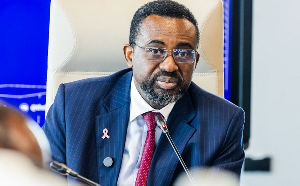Copyright ghanamma

Ghana is set to roll out its first-ever legal framework to regulate cryptocurrency and virtual assets before the end of this year, Governor of the Bank of Ghana (BoG), Dr Johnson Asiama, has disclosed. Speaking at the IMF/World Bank Spring Meetings in Washington, DC, Dr Asiama said a Virtual Assets Bill, developed with technical support from the International Monetary Fund (IMF), has already been drafted and is now on its way to Parliament. “We’ve done a lot of work in the past four months to put together the regulatory environment. That bill is on its way to Parliament, and hopefully, before the end of December, we should be able to regulate cryptos in Ghana,” Dr Asiama said. Cedi strengthens to GH¢10.70 against US dollar According to the Governor, the move comes after the central bank detected a surge in cryptocurrency use within Ghana’s remittance and informal foreign exchange markets. He explained that the BoG first became aware of the scale of crypto transactions earlier this year when remittance inflows through the banking system fell sharply following the cedi’s appreciation. “We saw the phenomenon at play when remittances suddenly reduced. Apparently, the diaspora that was sending the money was getting lesser amounts in local currency terms, so we saw a diversion of transmission channels; it was no longer going through the banks,” he added. Further investigations by the central bank found that some parallel market dealers were using stablecoins and other virtual assets to facilitate cross-border transfers. “Some of the dealers indicated to us that they were using stablecoins. That confirmed our sense that virtual assets were now being actively used even to terminate remittance inflows,” Dr Asiama said. Dr Asiama stressed that the BoG could no longer ignore the rapid spread of digital currency use and was determined to establish oversight to protect the financial system. “We have to step up and regulate and monitor these,” he added, noting that the BoG is setting up a specialised department to track crypto-related flows and enforce compliance once the bill takes effect. He cautioned, however, that legislation alone will not be enough, and that building institutional capacity is crucial to effective oversight. “Passing a law is just one step. The ability to monitor those flows will be key, and we are developing the expertise and manpower to do that,” he said. The upcoming Virtual Assets Bill is expected to provide a comprehensive legal framework for licensing, oversight, and anti-money-laundering compliance in Ghana’s digital assets market. Watch the latest episode of Health Focus below



